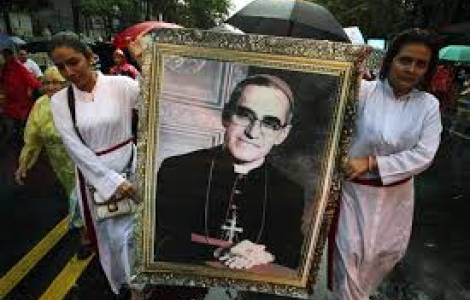
by Gianni Valente
Rome (Agenzia Fides) - Today, March 24, 2023, marks the 31st Day of Missionary Martyrs.
In 1992, the then Youth Movement of the Italian Pontifical Mission Societies (today Missio Giovani) proposed for the first time to the Italian Church the celebration of a Day that would commemorate those who lose their lives each year during their pastoral service. The young people chose March 24 as the date, so that it would be clear that the sisters and brothers killed as faithful to the Gospel.
The celebration ever since was placed on the day of the killing of Oscar Romero, the Salvadoran Archbishop who was murdered on March 24, 1980 while celebrating Mass in the chapel of the Hospedalito in San Salvador.
On January 8, 2015, the Congress of Theologians of the Congregation for the Causes of Saints had recognized by unanimous vote that Archbishop Romero was a martyr, killed "in odium fidei": what drove the executioners to eliminate him was not the desire to kill a political enemy, but the hatred unleashed by his predilection for the poor, a direct reverberation of his faith in Christ and his fidelity to the Church's Magisterium. Faith - the theologians of the Vatican dicastery recognized at the time - was the source of his actions, of the words he spoke and the gestures he made in the context in which he was called to operate and live as an archbishop.
In the El Salvador of death squads and civil war, the Church was suffering fierce persecution from people who were at least sociologically Christian. It was precisely the work of the beatification process that had confirmed that Romero-as Professor Roberto Morozzo della Rocca wrote-was "a Roman priest and bishop, obedient to the Church and the Gospel through Tradition," called to carry out his ministry as a pastor "in that extreme and distraught West that was Latin America in those years." Where priests and catechists were being murdered and in the countryside it became dangerous to possess a Gospel. Where it was enough to demand justice to be branded a subversive communist.
The recognition of Archbishop Romero's martyrdom was a decisive moment in the path of the process for his canonization. The martyred Archbishop was elevated to the glory of the altars as a Blessed on May 23, 2015, and was proclaimed a Saint along with Pope Paul VI and five other Blesseds by Pope Francis in the solemn Eucharistic liturgy he presided over in St. Peter's Square on October 14, 2018.
In recent days, Fides has re-proposed the stories of 5 martyred men and women missionaries, for whom the process of beatification is underway or has recently concluded. In the series of articles edited by Stefano Lodigiani, the martyrdom of Sister Maria Agustina Rivas was retraced, killed on September 27, 1990 in Peru by the Sendero Luminoso guerrillas; that of Italian doctor Luisa Guidotti, a lay missionary killed in Zimbabwe on July 6, 1979; of the young Pakistani Akash Bashir, killed on 15 March 2015 in Lahore by a suicide bomber, and those of João de Deus Kamtedza and Sílvio Alves Moreira, Jesuit fathers kidnapped and killed in Mozambique on October 30, 1985.
The story of St. Romero, and also those of the new martyrs retraced by Fides (a nun, a laywoman, a young man, two priests) help to perceive the luminous warp that along the history of salvation weaves together martyrdom, apostolic mission and holiness. The Church has never complained about her martyrs. She has never been reticent in proclaiming that it is they, with their lives torn by force and with pain from bloody deaths inflicted by bloodthirsty executioners, who foretaste the glory of Paradise. They attest and testify to a predilection that makes those very lives embraced and clothed in unparalleled bliss. In the incomparable dynamism of grace, scandal and foolishness to the world, martyrdom and bliss become synonymous.
At the beginning of the Christian story in the world, the title of "martyr", that is "witness", was reserved for the Apostles and disciples of Jesus. To those who had been "eyewitnesses" to the life of Christ, his Passion, and death, and had encountered the Risen One. But already during the great persecutions of the first centuries of Christianity, those who were condemned to death "in odium fidei," because of the faith, also began to be called "martyrs."
The martyrial connotation accompanies and will always accompany the Church's journey through history. And the Church will always recognize the intimate and special bond of communion that unites the martyrs to Christ himself and to His mystery of salvation. For this reason, too, the current legislation on the Causes of Canonization, defined on this point by the Apostolic Constitution Divinus perfectionis Magister, promulgated by John Paul II on January 25, 1983, stipulates that in the procedures for the beatification of a martyr, proof and recognition of a miracle that occurred through the intercession of the person to be beatified is not required.
Martyrdom is recognized as such an evident manifestation of one's love for God and one's conformation to Christ that the "confirmation" of the recognition of a miracle is not necessary to affirm that martyrs, all martyrs, are in Heaven.
As St. Augustine writes in Sermon 280, recalling the "dies natalis" of the Roman martyrs Perpetua and Felicita, "just as that One gave his life for us, so the martyrs followed his example and gave their lives for their brethren; even for the purpose of raising a most abundant harvest of peoples, almost sprouts, they irrigated the earth with their blood. Therefore we too are the fruits of their toil. We admire them; they have compassion on us. We rejoice with them, they pray for us". (Agenzia Fides, 24/3/2023)